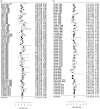Associating sporadic, foodborne illness caused by Shiga toxin-producing Escherichia coli with specific foods: a systematic review and meta-analysis of case-control studies
- PMID: 31364553
- PMCID: PMC6625202
- DOI: 10.1017/S0950268819001183
Associating sporadic, foodborne illness caused by Shiga toxin-producing Escherichia coli with specific foods: a systematic review and meta-analysis of case-control studies
Abstract
Shiga toxin-producing Escherichia coli (STEC) infections are a significant public health issue, with foodborne transmission causing >1 million illnesses worldwide each year. We conducted a systematic review and meta-analysis (PROSPERO registry # CRD42017074239), to determine the relative association of different food types with sporadic illnesses caused by STEC. Searches were conducted from 01 August to 30 September 2017, using bibliographic and grey literature databases, websites and expert consultation. We identified 22 case-control studies of sporadic STEC infection in humans, from 10 countries within four World Health Organization subregions, from 1985 to 2012. We extracted data from 21 studies, for 237 individual measures in 11 food categories and across three status types (raw or undercooked, not raw and unknown). Beef was the most significant food item associated with STEC illness in the Americas and Europe, but in the Western Pacific region, chicken was most significant. These findings were not significantly moderated by the raw or cooked status of the food item, nor the publication year of the study. Data from the African, South-East Asian and Eastern Mediterranean subregions were lacking and it is unclear whether our results are relevant to these regions.
Keywords: Epidemiology; Shiga-like toxin-producing E. coli; food-borne infections; gastroenteritis.
Conflict of interest statement
SEM, SMP and BD have worked previously with the World Health Organization under the Foodborne Disease Burden Epidemiology Reference Group. SEM is an Associate Editor at Epidemiology and Infection, and has served as a paid Expert on behalf of the Attorney General of Canada in legal proceedings, providing evidence on the public health risks and benefits of unpasteurized milk. No other authors report any conflicts of interest.
Figures



References
-
- Pires SM et al. (2009) Attributing the human disease burden of foodborne infections to specific sources. Foodborne Pathogens and Disease 6, 417–424. - PubMed
-
- Kintz E et al. (2017) Transmission pathways for sporadic Shiga-toxin producing E. coli infections: a systematic review and meta-analysis. International Journal of Hygiene and Environmental Health 220, 57–67. - PubMed
-
- Sargeant JM and O'Connor AM (2014) Introduction to systematic reviews in animal agriculture and veterinary medicine. Zoonoses and Public Health 61, 3–9. - PubMed
Publication types
MeSH terms
LinkOut - more resources
Full Text Sources
Medical
Miscellaneous

